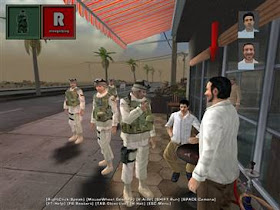Since 1993, Milwaukee area psychology teachers have gathered twice a year to share teaching ideas and develop friendships. Our group has come to be called the "Milwaukee Area Teachers of Psychology" (MATOP). Below you will find an invitation to our next meeting on November 9th. If you live within driving distance of the Milwaukee area, please feel free to attend. If you would like to be included on the MATOP mailing list please contact me at the email address below.
For those of you not within driving distance of Milwaukee, feel free to "check out" our agenda for items you might find useful in your classroom. Whenever possible, I have tried to include email or website addresses for further information. Please contact me with any questions you may have.
Kent
Kent Korek
Germantown High School
W180 N11501 River Lane
Germantown, WI 53022
Phone: 262-253-3400
Fax: 262-253-3494
kkorek@germantown.k12.wi.uskkorek@germantown.k12.wi.us
Dear Psychology Teacher:
Please consider attending our semi-annual meeting of the Milwaukee Area Teachers of Psychology (MATOP) on
Tuesday, November 9, 2010 at 7:00 p.m. at Pius XI High School, 135 N. 76th Street, Milwaukee 53213 in the Library.
Our meeting will include:
■ an inspection of the new
Myers’ Psychology for AP supplements courtesy of Eileen Tanania, Bedford, Freeman, & Worth Publishing, (866-843-3715 ex 1714)
etanania@bfwpub.com Thanks to Eileen for providing copies of the Teacher’s Edition and Student Study Guide for everyone coming to the meeting. For more information on this text, go to
http://www.bfwpub.com/HIGHSCHOOL/newcatalog.aspx?disc=HS&course=Social+Studies&type=AP*+Social+Studies&isbn=1429244364/ ■ insights from the
2010 AP Psychology Reading. We anticipate a number of AP Psychology table leaders and readers will be attending our meeting. Come listen to their reflections on Kansas City and the 2010 reading. The FRQs, rubrics, sample responses, etc. can be found at
http://apcentral.collegeboard.com ■ a review of the new 19th edition of
Psychology and Life by Gerrig and Zimbardo. Everyone attending our meeting will receive an examination copy of this mainstay text through the generosity of Kevin Kuckkan of Pearson School (866-340-3692)
kevin.kuckkan@pearson.com To read more about this text, go to
http://www.pearsonhighered.com/educator/product/Psychology-and-Life/9780205685912.paget ■ a report from the October 22nd
College Board One-Day Workshop at Grayslake, IL. We would ask anyone who attended this institute, to briefly discuss the events of the day. We’ve been in contact with Mary Spilis, the College Board consultant who coordinated the day at Grayslake, who has agreed to share with us some items from the day.
■ an analysis of the supplements for
Psychology: Themes and Variations 8e by Wayne Weiten. Thanks to Katie Golem, Holt McDougal Sales Representative for Advanced & Elective Programs, (800-479-9799 ex. 3870)
katie_golem@hmhpub.com for providing us copies of these resources. For more information on Weiten’s text, go to
http://holtmcdougal.hmhco.com/hm/detail.htm?ID=1007500000073418 ■ a demonstration of the
new inversion goggles from www.PsychKits.com. These new goggles, selling for only $25, literally turn the world upside down. One lucky person will leave with a pair of these goggles courtesy of Gerry Palmer
palmtree60045@yahoo.com of Psychkits at
http://www.psychkits.com ■ an examination of the supplements for the new REGULAR Psychology textbook,
Psychology: A Discovery Experience by Stephan Franzoi of Marquette University. These supplements were provided by Mary Sommers of Cengage Learning (608-239-1928)
mary.sommers@cengage.com Thanks to Mary for all her help. To find out more about this new text, go to
http://www.cengage.com/search/showresultsbysortpage.do?pageSize=10&urlQueryString=Ne%3D2%26N%3D+15+4294922390+4294950661
■ information from the October 22nd
CHI-TOPSS meeting at Lincoln-Way Central High School in New Lenox, IL.
■ a Powerpoint presentation of
AP Psychology Exam statistics. The 2011 AP Psychology Exam will be the nineteenth time the exam has been given. Over the course of those years, a number of stats have been generated.
■ a discussion of
changes in the AP Psychology Exam. Items include; online retrieval of scores, moving the exam to the first Monday of the cycle, scoring changes with regards to guessing, and more.
■ information on
smartphone apps for Quizlet flashcards. A number of different cell phone apps have been developed applicable for Quizlet files. Your students can now study their psychology terms and concepts using their smartphones and iPads, iTouches, etc.
■ and more.
Everyone is welcome to attend. There is no need to RSVP. Please feel free to invite anyone you feel might be interested in coming.
If you have any questions concerning our meeting, please contact Ruth Regent-Smith at Pius H.S. (414-290-7000)
rregent@piusxi.org or Kent Korek at Germantown H.S. (262-253-3400)
kkorek@germantown.k12.wi.us.
For more information on MATOP go to
http://www.germantownschools.org/faculty/kkorek/MATOP_Home_Page.cfm. For directions to Pius go to
http://www.piusxi.org/prospective/Transportation.aspx We look forward to seeing you.
Ruth Regent-Smith
Kent Korek








































